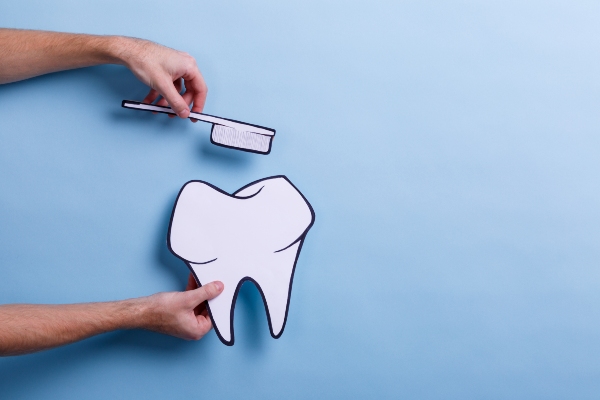Should You Tell Your Dentist if You Have Dental Anxiety

Dental anxiety affects millions of people in the U.S. This anxiety can often prevent patients from getting treatments that can keep oral diseases like tooth decay and gum disease away or prevents them from getting worse. Dental phobias can be the result of previous bad experiences with dentists, or they can be caused by a fear of being judged because of the condition of your teeth.
What is dental anxiety?
For patients to gain control of their dental anxiety, they must first understand what it is and how it manifests itself. The American Dental Association (ADA) defines dental anxiety as a feeling of great uneasiness, apprehension, or fear of the unknown with receiving dental care. Dental anxiety is a common condition, but many are unaware of the many ways it shows up in their lives. Patients who experience any of the following most likely have dental anxiety:
Fear of the dentist or being afraid to schedule a dental appointment
Fear of needles and shots
Fear of dental tools, such as a drill, scaler, or saliva ejector
Fear of pain or discomfort during or after the appointment
Generalized worry about medical procedures and treatments, including dental care
Talking to your dentist about dental anxiety
Talking to a dentist about dental anxiety is the first step toward overcoming it. Dentists accommodate patients with these fears regularly, and they can take simple steps like using less intimidating tools to make the experience more pleasant for the patient.
Dentists also have access to sedatives like nitrous oxide that can be used to keep patients relaxed during their treatments.
How dentists can help with dental anxiety
Here are some of the ways dentists can help patients to get past dental anxiety:
Customizing the patient's treatments: Dental anxiety is one of the issues dentists often deal with, and they have a variety of tricks they use to keep their patients relaxed. Once a dentist is aware of their patient's dental fears and their cause, they will take extra steps to avoid trigging these fears. For example, if the patient is terrified of loud dental tools like drills, the dentist might opt to use a laser instead.
Teach patients relaxation techniques: Simple things like taking deep, slow breaths can help to reduce many forms of anxiety. Dentists can educate patients about easy relaxation techniques they can use before and after their treatments.
Time-out signals: Dentists who are working with patients with dental anxiety often come up with a signal that the patient can use to let them know they need a break. Sitting in a dental chair and having people hover can be uncomfortable for even those without dental anxiety. Knowing patients can take a break whenever they wish often makes things easier.
Dental sedatives: Dental sedatives help to keep patients with phobias relaxed at the dentist's. The most common sedative used in dentistry is nitrous oxide. This is a fast-acting gas that keeps patients relaxed and happy during their treatments. Dentists also prescribe sedatives like valium that patients can take before their appointment. This can be helpful for those who deal with anxiety before they even get to the clinic. Patients who decide to explore sedation dentistry should arrange for transportation to and from the clinic.
Avoiding the dentist altogether is not recommended because it can lead to severe consequences such as tooth decay, which could require extensive treatment or even extractions of teeth later down the line. Also, remember that any type of pain later on when they reach advanced stages without being treated earlier because of fear or anxiety of going through treatments like drilling and root canal therapy. These things need urgent attention from time to time because they cause irreversible damage and future fear when going to the dentist.
Take control of your fears
Dental anxiety is not something to dismiss, and it is not shameful. Talking about it with your dentist is the first step to getting help. If you are experiencing dental anxiety and feel as though visiting the dentist will make things worse, we recommend calling our office and explaining your concerns beforehand. In doing so, we can work with you to craft a plan from start to finish to ease your anxiety.
{{DBA}} strives to create a comfortable environment and easily guide all of our patients through every treatment or procedure they may require. If you are curious about how we help patients through dental anxiety or the specifics of a possible treatment, visit https://www.palmbeachdentistry.com. Additionally, we invite you to call our Delray Beach office at {{PHONE}} to speak with our experienced and caring staff to schedule an appointment.
Check out what others are saying about our dental services on Yelp: Dental Anxiety in Delray Beach, FL.
Recent Posts
If you get nervous going to the dentist, you are not alone. Dental anxiety is a common problem that almost everyone struggles with from time to time. Most people experience it before and during a procedure or appointment. While it may seem difficult to overcome, it is possible with the help of an experienced dentist.…
Routine dental care is one of the most important factors contributing to good dental health. While going to the dentist twice a year is the standard rule of thumb, the frequency of the visits ultimately depends on the patient's needs and the recommendation of the dentist. Learn how often routine care should be scheduled and…
Prioritizing routine dental care is necessary for good health. Unfortunately, some people can find it difficult to care properly for their teeth by brushing, flossing, and seeing a dentist on a regular basis. Patients who disregard dental hygiene and professional care need immediate action to prevent dangerous outcomes.In addition to an unsightly smile, failing to…
Many people may believe that they do not have time for routine dental care, which consists of daily brushing and flossing as well as periodic cleaning by a dentist. Admittedly, these tasks do take some time but should be a priority even in a busy schedule. People who do not take time for brushing, flossing,…


